
|
|
|
|
REGULAR SESSION
The Inter-American Court of Human Rights held its 145th Regular Session 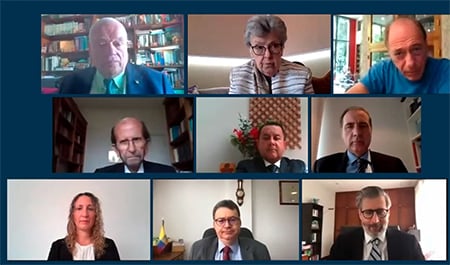 The Inter-American Court held its 145th Regular Session from November 1-26, 2021.
JUDGMENTS
Ecuador is responsible for the arbitrary detention of police officers In the Judgment notified on November 10, 2021, in the Case of Villarroel Merino et al. v. Ecuador, the Inter-American Court of Human Rights found the State of Ecuador internationally responsible for the violation of the right to personal liberty and the principle of the presumption of innocence and equality before the law due to a lack of detention oversight; insufficient grounds for the detention order, as well as the lack of an appropriate and effective remedy to ensure the lawfulness of the deprivation of liberty; and the violation of the judicial guarantees of independence and impartiality, against former police officers Jorge Humberto Villarroel Merino, Mario Romel Cevallos Moreno, Jorge Enrique Coloma Gaibor, Fernando Marcelo López Ortiz, Leoncio Amílcar Ascázubi Albán, and Alfonso Patricio Vinueza Pánchez.
Venezuela is responsible for the arbitrary detention of family members In the Judgment notified on November 15, 2021, in the Case of González et al. v. Venezuela, the Inter-American Court of Human Rights found the Bolivarian Republic of Venezuela internationally responsible for violating the rights to personal liberty, personal integrity, and judicial guarantees of Belkis González, María Angélica González, Fernando González, Wilmer Antonio Barliza González, Luis Guillermo González, and Olimpiades González. It also found a violation of judicial guarantees against Aura González.
Chile is responsible for violating the rights of childhood, life, and health of a disabled girl In its Judgment in the Case of Vera Rojas et al. v. Chile, notified on November 18, 2021, the Inter-American Court of Human Rights declared the State of Chile internationally responsible for violating the rights of life, dignity, personal integrity, childhood, health, and social security—in conjunction with the obligation to ensure rights without discrimination and the duty to adopt domestic legal provisions—of Martina Vera Rojas and for violating her parents’ right to personal integrity. The official summary of the Judgment can be found here and the full text of the Judgment can be found here.
Brazil is responsible for the improper use of parliamentary immunity in the investigation of femicide In its Judgment of the Case of Barbosa de Souza et al. v. Brazil, notified on November 24, 2021, the Inter-American Court of Human Rights found the State of Brazil internationally responsible for the violation of the rights of judicial guarantees, judicial protection, and equality before the law due to the improper use of parliamentary immunity for the person with primary responsibility for the murder of Márcia Barbosa de Souza; the lack of due diligence in investigating said crime; the gender discrimination in those investigations; and the violation of the reasonable time requirement, as well as the violation of the right to personal integrity, to the detriment of the relatives of Márcia Barbosa.
Case of Manuela et al. v. El Salvador: The State is responsible for the detention, sentencing, and death of a woman with an obstetric emergency
In its Judgment in the Case of Manuela et al. v. El Salvador, notified on November 30, 2021, the Inter-American Court of Human Rights declared the State of El Salvador internationally responsible for violating the rights to personal liberty, judicial guarantees, equality before the law, life, personal integrity, privacy, and health of Manuela, as well as for violating the right to personal integrity of Manuela’s relatives.
Peru is responsible for the arbitrary dismissal of Judges and Prosecutors
In its Judgment of the Case of Cuya Lavy et al. v. Peru, notified on December 10, 2021, the Inter-American Court of Human Rights found the State of Peru internationally responsible for a series of violations committed in the context of processes for evaluating and confirming two Judges and two Prosecutors by the National Council of the Judiciary (CNM for the Spanish) from 2001-2002. In its judgment, the Court highlighted the violation of the rights to judicial guarantees, privacy, political rights, and judicial protection to the detriment of Jorge Luis Cuya Lavy (judge), Jean Aubert Díaz Alvarado (prosecutor), Walter Antonio Valenzuela Cerna (judge), and Marta Silvana Rodríguez Ricse (prosecutor).
Judgment of the Case of the Maya Kaqchikel Indigenous Peoples of Sumpango et al. v. Guatemala: The State is responsible for violating the freedom of expression and the cultural rights of four indigenous communities operating community radios
In its Judgment notified on December 17, 2021, in the Case of the Maya Kaqchikel Indigenous Peoples of Sumpango et al. v. Guatemala, the Inter-American Court of Human Rights found the State of Guatemala internationally responsible for violating the rights of freedom of expression, equality before the law, and participation in cultural life, against the indigenous communities of Maya Kaqchikel de Sumpango, Maya Achí de San Miguel Chicaj, Maya Mam de Cajolá, and Maya Mam de Todos Santos Cuchumatán. These violations occurred primarily because Guatemala's regulatory framework for broadcasting, in particular the General Law of Telecommunications (LGT for the Spanish), in practice kept these indigenous communities from legally operating their community radios.
Judgment of the Case of Maidanik et al. v. Uruguay. The State is responsible for the forced disappearance of two individuals during the dictatorship, as well as for a lack of investigative diligence in the case of the violent deaths of three young women
In the Judgment of the Case of Maidanik et al. v. Uruguay, notified on December 20, 2021, the Inter-American Court of Human Rights declared the State of Uruguay internationally responsible for violating several human rights of Luis Eduardo González González and Óscar Tassino Asteazu (victims of forced disappearances that began during Uruguay’s 1973-1985 dictatorship), and their relatives. It also found Uruguay internationally responsible for violating the human rights of the relatives of Diana Maidanik, Silvia Reyes, and Laura Raggio (executed by the military during the same period). More than three decades later, the full truth about these events is still unknown, and those criminally responsible have not been identified.
Judgment in the Case of the Teachers of Chañaral and other municipalities v. Chile: The State is responsible for failing to exercise due diligence to comply with judgments recognizing the payment of a special allowance to 846 teachers
In the Judgment of the Case of the Teachers of Chañaral and other municipalities v. Chile, notified on December 21, 2021, the Inter-American Court of Human Rights declared the State of Chile internationally responsible for violating several rights of 846 teachers in the municipalities of Chañaral, Chanco, Pelluhue, Parral, Vallenar, and Cauquenes.
Judgment of the I/A Court H.R. in the Case of Julien Grisonas Family v. Argentina: The State is internationally responsible for the forced disappearance of two individuals, committed under the 1976-1983 Systematic Repression Plan as part of “Operation Condor”
In the Judgment in the Case of Julien Grisonas Family v. Argentina, notified on December 21, 2021, the Inter-American Court of Human Rights concluded that the State is responsible for the forced disappearance of a married couple: Mario Roger Julien Cáceres and Victoria Lucía Grisonas Andrijauskaite. It thus found that their rights to the recognition of juridical personhood, life, personal integrity, and personal liberty had been violated.
Judgment of the I/A Court H.R. in the Case of Palacio Urrutia et al. v. Ecuador: The State is responsible for the violation of the rights to freedom of expression, movement and residence, and job stability of a journalist and managers of a newspaper
In the Judgment in the Case of Palacio Urrutia et al. v. Ecuador, notified on December 21, 2021, the Inter-American Court of Human Rights declared the State of Ecuador internationally responsible for violating the rights to freedom of expression, freedom from ex post facto laws, movement and residence, job stability, judicial guarantees and protection, and the duty to adopt domestic legal provisions, against Emilio Palacio Urrutia, Nicolás Pérez Lappenti, César Enrique Pérez Barriga, and Carlos Eduardo Pérez Barriga.
Judgment of the I/A Court H.R. in the Case of the Massacre of the Village of Los Josefinos v. Guatemala: The State is responsible for forced disappearance, forced displacement, and the violation of multiple rights in the massacre of the Village of Los Josefinos in the year 1982
In the Judgment notified on December 21, 2021 in the Case of the Massacre of the Village of Los Josefinos, the Inter-American Court of Human Rights found the State of Guatemala internationally responsible for human rights violations in connection with the massacre of the village of Los Josefinos, which took place on April 29-30, 1982, in the context of the internal armed conflict in Guatemala.
Judgment in the Case of Digna Ochoa et al. v. Mexico. The State is responsible for grave shortcomings in the investigation of the death of human rights defender Digna Ochoa
In the Judgment notified on January 19, 2022, in the Case of Digna Ochoa et al. v. Mexico, the Inter-American Court of Human Rights found Mexico internationally responsible for grave shortcomings in its investigation of the death of human rights defender Digna Ochoa and Plácido, which occurred on October 19, 2001. The State partially acknowledged international responsibility in the case.
Case of Former Employees of the Judiciary v. Guatemala. The State is responsible for dismissing judicial employees because of a strike
In the Judgment notified on January 26, 2022, in the Case of Former Employees of the Judiciary v. Guatemala, the Inter-American Court of Human Rights found Guatemala internationally responsible for violating several rights of 65 former employees of the judiciary in Guatemala by dismissing them because of their alleged participation in a striken movement that was declared illegal.
MONITORING COMPLIANCE WITH JUDGMENT
Argentina complied with the Judgment in the Case of Perrone and Preckel In accordance with the Judgment Compliance Monitoring Resolution issued by the Court on November 17, 2021, Argentina fulfilled its obligation to carry out all reparations ordered in the October 8, 2019 Judgment. The Inter-American Court therefore decided to close the case.
“HERNÁN SANTA CRUZ DIALOGUE IV”
Hernán Santa Cruz Dialogue: Promotion of economic, social, cultural, and environmental rights Implications for development, sustainability, and peace during COVID-19 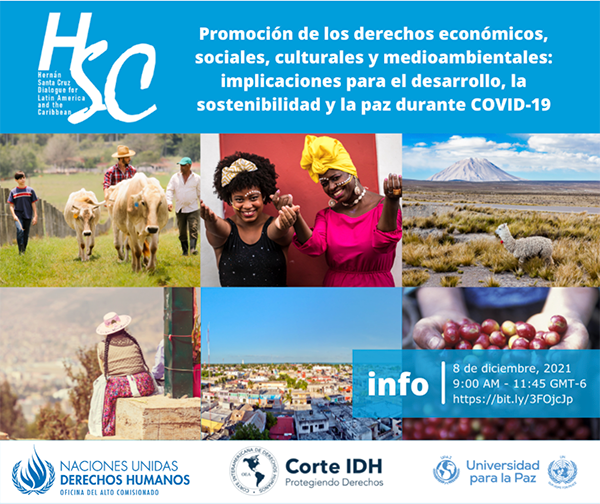
On December 8, 2021, the fourth Hernán Santa Cruz Dialogue for Latin America and the Caribbean was held. The event was jointly organized by the Office of the United Nations High Commissioner for Human Rights (OHCHR), the University for Peace (UPEACE), and the Inter-American Court of Human Rights.
DIPLOMA FOR JOURNALISTS
Third iteration of the Diploma in Human Rights for Latin American and Caribbean Journalists concludes 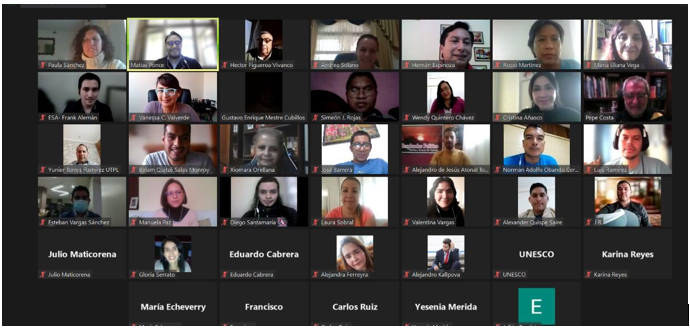
November 16, 2021, marked the conclusion of the third iteration of the Diploma in Human Rights for Journalists, organized by the Inter-American Court of Human Rights, along with the UNESCO Regional Office for Communication and Information, the Konrad Adenauer Rule of Law Program for Latin America, and the Inter-American Institute of Human Rights. The program also received support from the European Commission.
|
ELECTION OF NEW LEADERSHIP FOR THE INTER-AMERICAN COURT
I/A Court H.R. elects new leadership for 2022-2023. Judge Ricardo C. Pérez Manrique (Uruguay) elected President of the I/A Court H.R. and Judge Humberto Antonio Sierra Porto (Colombia) elected Vice President 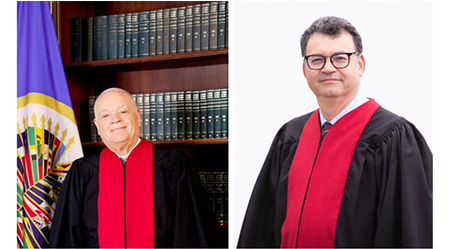
During its 145th Regular Session Period, the Inter-American Court of Human Rights chose Judge Ricardo C. Pérez Manrique of Uruguay as its new President. At the same time, it chose Judge Humberto Antonio Sierra Porto as its new Vice President. The elected President and Vice President will begin their term on January 1, 2022, and will complete it on December 31, 2023.
EVENT FOR INTERNATIONAL DAY FOR THE ELIMINATION OF VIOLENCE AGAINST WOMEN
Round Table: Gender Stereotypes and the Administration of Justice 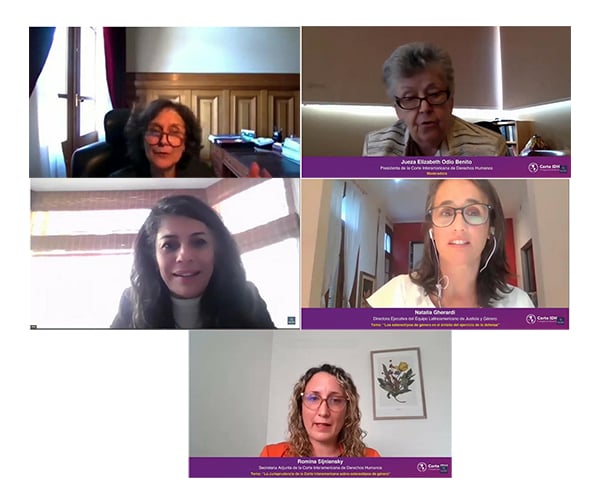
The Round Table entitled: Gender Stereotypes and the Administration of Justice took place on the International Day for the Elimination of Violence against Women, with the participation of former IACtHR President Judge Elizabeth Odio Benito and various experts from the region.
CONCLUSION OF SEMILLERO (SEEDBED) LATAM 2021
Semillero (Seedbed) LATAM, organized by the Human Rights Center of the University of Buenos Aires and the KAS Foundation’s Rule of Law Program for Latin America, came to an end 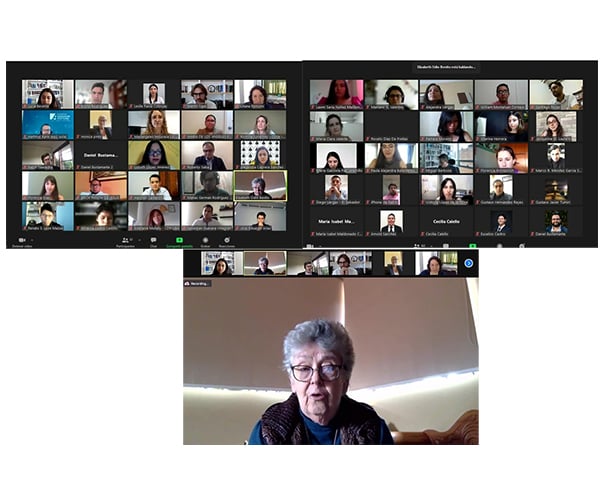
With the participation of former IACtHR president Elizabeth Odio Benito, Secretary Pablo Saavedra, and Deputy Secretary Romina I. Sijniensky, the LATAM Seedbed was concluded. This regional course for students from the Americas was organized by the Human Rights Center of the University of Buenos Aires, the IACtHR, and the KAS Foundation’s Rule of Law Program for Latin America.
DIALOGUE
I/A Court H.R. carries out Annual Dialogue with children and teenagers of Latin America and the Caribbean
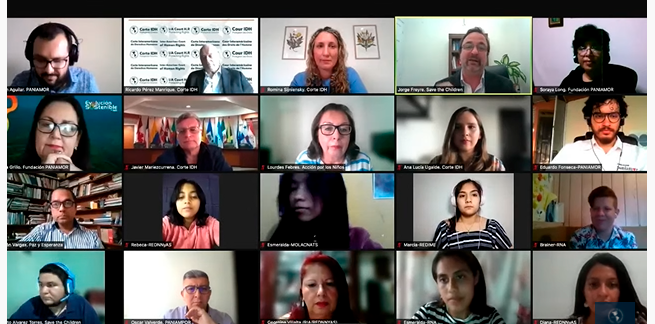
On November 16, the third Dialogue between the Inter-American Court of Human Rights and children and adolescents of the region took place, focusing on their participation in the dispute proceedings and advisory proceedings of the Court in San José.
THREE REGIONAL COURTS
2020 Joint Case Law Report: The Three Regional Human Rights Courts 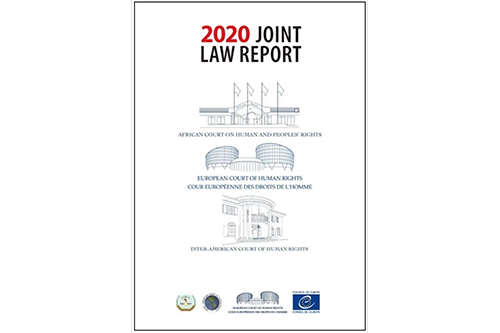
The Inter-American Court of Human Rights, the European Court of Human Rights, and the African Court on Human and Peoples’ Rights announced the second Joint Report on their 2020 Case Law, which includes a selection of their principal case law developments during that year. The 2020 Joint Case Law Report can be found here.
TRAINING IN HUMAN RIGHTS
The Interamerican Court inaugurated its Course “The right to social protest, public order and the Inter-American Court of Human Rights”, in Ecuador 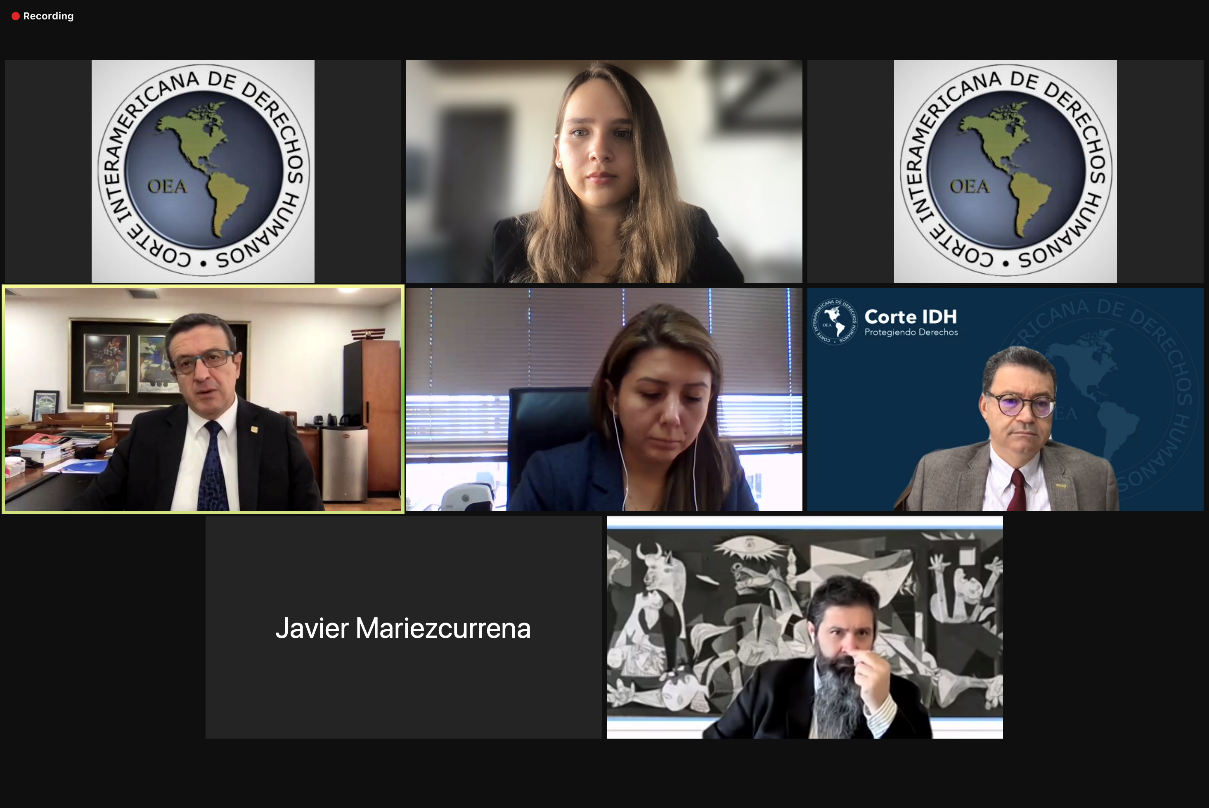
On November 8, Humberto Antonio Sierra Porto, Judge of the Inter-American Court of Human Rights, and Íñigo Salvador Crespo, Attorney General of the State of Ecuador, launched in Ecuador the course entitled: The right to social protest, public order, and the Inter-American Court of Human Rights.
Course launched in Bolivia the course entitled: “The Inter-American Court of Human Rights and some of its principal lines of Case Law” 
On November 15, then-Vice President of the Inter-American Court of Human Rights Judge Patricio Pazmiño Freire and the Vice Minister of Foreign Affairs of the Plurinational State of Bolivia Erwin Freddy Mamani Machaca launched in Bolivia a course on The Inter-American Court of Human Rights and some of its principal lines of Case Law.
The Inter-American Court concluded a course in Bolivia on Some of its principal lines of Case Law 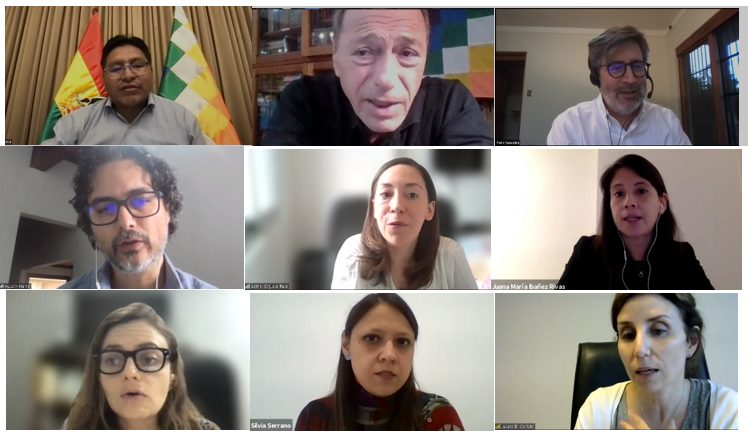
On November 18, 2021, Secretary Pablo Saavedra Alessandri of the Inter-American Court of Human Rights and Vice Minister of Foreign Affairs of the Plurinational State of Bolivia Erwin Freddy Mamani Machaca concluded a course on The Inter-American Court of Human Rights and some of its principal lines of Case Law, which took place in Bolivia from November 15-18. More than 130 people participated in the closing event, including high-level officials of the Bolivian executive branch and judiciary, as well as other key human rights authorities in the country. Judge Eugenio Raúl Zaffaroni gave the closing keynote address.
The Inter-American Court launched in Honduras the third Course on Impunity and Serious Human Rights Violations On November 22, the Inter-American Court launched in Honduras the third iteration of the Impunity and Serious Human Rights Violations course. The then-president of the Court, Judge Elizabeth Odio Benito, participated virtually and emphasized the importance of combating impunity. The course took place from November 22-25 on the videoconference platform of the Francisco Salomón Jiménez Castro Law School of Honduras, through which more than 35 legal professionals participate, including judges, officers of the Attorney General's Office of the Republic and of the National Commission on Human Rights, as well as other key institutions working to protect human rights in the country.
The Inter-American Court concluded a course in Ecuador on The right to social protest, public order, and the Inter-American Court of Human Rights 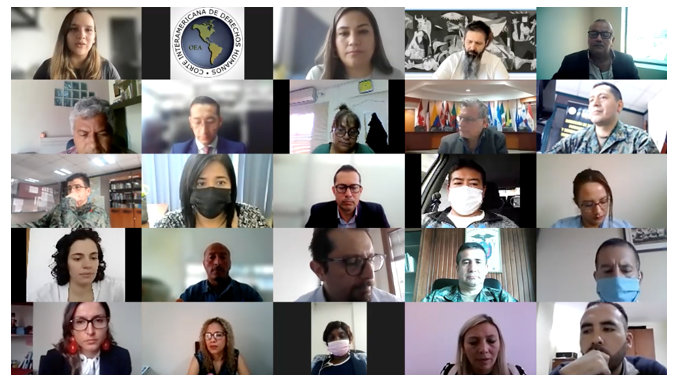
On November 23, the Inter-American Court of Human Rights concluded a course on The right to social protest, public order, and the Inter-American Court of Human Rights.
Introductory Self-guided Course on the I/A Court H.R.’s Case Law on the Human Rights of Women As part of the activities for the International Day for the Elimination of Violence against Women, celebrated on November 25, the I/A Court H.R. is making available to the public the self-guided version of its Introductory Course on the I/A Court H.R.’s Case Law on the Human Rights of Women.
The Inter-American Court launched in El Salvador the third Course on Impunity and Serious Human Rights Violations On November 29, the Inter-American Court launched in El Salvador the third iteration of the Impunity and Serious Human Rights Violations course. The then-president of the Court, Judge Elizabeth Odio Benito, participated virtually and emphasized the importance of investigating, prosecuting, and eventually sanctioning and remedying serious human rights violations.
PUBLICATIONS
The Inter-American Court presents its Case Law Bulletin on its most important case law related to Guatemala 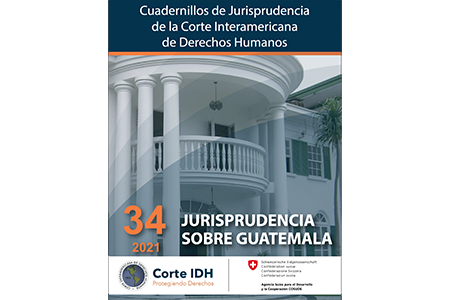
On October 27, 2021, the Inter-American Court published the 34th Case Law Bulletin of the Inter-American Court of Human Rights: Case Law on Guatemala. This Bulletin is intended to disseminate the case law of the Inter-American Court with respect to the Republic of Guatemala, and it is one in a series of publications—along with the Bulletins on El Salvador, Mexico, Panama, and Honduras—that aim to systematize the precedents in the Court’s case law by country to make them more accessible to interested individuals. here.
Publication of the 7th Case Law Bulletin of the Inter-American Court of Human Rights: Conventionality Review, Updated to 2021 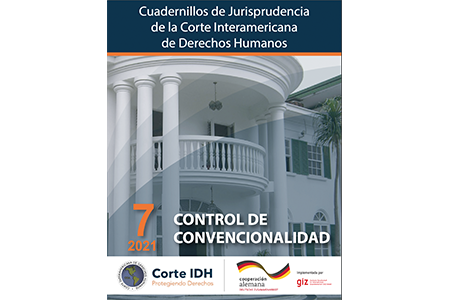
The Inter-American Court published an update of its 7th Case Law Bulletin of the Inter-American Court of Human Rights: Conventionality Review. This legal concept has been developed significantly by the I/A Court H.R. in recent years, and it has become an effective tool for applying international human rights law domestically. This update incorporates the Court's most recent decisions on this subject. The Bulletin can be foundo here.
|
||||||||||||||||||||||||||||||||||||||||||||||||||||||||||||||||||||||||||||||||||||||||||||||||||||||||||||||||||||||||||||||||||||||||||||||||||||||||||||||||||||||||||||||||||
|
|
|
|
|
|